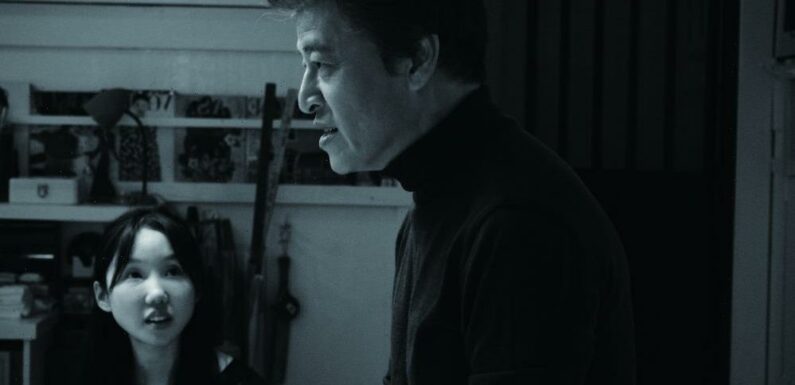
If ever you’ve glanced into lit-up living rooms while driving down a suburban street at dusk, or glimpsed a neighbor’s apartment over their shoulder when you drop off a package, and found yourself idly wondering not just what the inhabitants’ lives are like, but what maybe your life would be like if you occupied those exotic domestic spaces — well, has mischievous Korean miniaturist Hong Sangsoo made a movie for you. “Walk Up,” the festival darling’s latest benignly sozzled, black-and-white delight, daydreams around that idea, its gentle profundity smuggled in under cover of multilevel playfulness. The movie is a play on time, on imaginative shoestring filmmaking, and on Hong’s own persona. It’s even a play on words, with its three stories sprouting out from each other over three separate stories of the same Seoul walk-up.
“It’s been a long time. How long has it been?” The first exchange delivers a little puff of amusement for denizens of the Hong Hive (an exclusive club for which “Walk Up” could be the first title in a while to bring in a new recruit or two). Not only is a strained reunion between long-separated friends a staple beginning for the filmmaker, but there’s a little irony in the fact that for us, it hasn’t been long at all. Hong’s last movie “The Novelist’s Film,” played in Berlin earlier this year, while the one before, “In Front of Your Face,” was in Cannes in 2021. Both star Lee Hyeyoung, a lovely, elegant actor whose dormant movie career has been rejuvenated by her Hong joints, and who here plays Ms. Kim, the old acquaintance whom filmmaker Byungsoo (frequent Hong avatar Kwon Haehyo) has come to visit.
Byungsoo has brought along his daughter Jeonsu (Park Miso) to consult interior designer Ms. Kim about Jeonsu’s notion to study in the same field. No one here is particularly close, so the first of the film’s many tableside chats gets off to a stilted start. Soon, though, the wine begins to flow, Ms. Kim begins to flirt and crisply edited, cool-toned scenes that seem to run on from each other seamlessly, turn out not to be happening when we think, and maybe not happening at all. Before we realize it, we’re sliding around around the chicanes of one of Hong’s most cleverly constructed Möbius-strip narratives.
Ms. Kim owns this building, and rents out the upper apartments, through which she takes Byungsoo and Jeonsu blithely, assuring them that “no one locks their doors here.” But later, after the first of the film’s imperceptible folds in time, when Byungsoo is introduced to, then promptly living with, Sunhee (Song Sunmi) who runs the restaurant on the second floor, the landlady/tenant relationship no longer seems so cordial. And by the time Byungsoo is occupying the balcony flat on the top floor, being mothered with wild ginseng and fancy cigarettes by another girlfriend, Jiyoung (Cho Yunhee), interactions with Ms. Kim are downright frosty.
Inasmuch as Hong would ever write one, Ms. Kim becomes the villain of the piece. Forever in the same outfit, forever with her kitten heels clicking unsteadily up and down the concrete steps of the building, she goes from enigmatic, commanding career woman to prying landlady with boundary issues and a fondness for alcohol that, even in typically squiffy Hongland, seems excessive.
Rarely is professional, romantic, familial, creative and existential angst (and this is perhaps Hong at his most early-Woody Allen) delivered with such a light heart. It matches the gently plucked strings of the score and the light, fresh monochrome favored by Hong (again his own cinematographer, editor, writer, composer, producer and sound man; he probably made the sandwiches too), which tends toward the whiter and mid-tone-pale-grayer end of the spectrum.
Within these feathery, simply composed images, interconnecting motifs recur: tiny repetitions with minor variations that link each of Byungsoo’s alternate realities. His immaculately maintained classic Mini Cooper echoes in Sunhee’s modern version of the same car. The same art-versus-commerce frustrations thread through multiple anecdotes. Someone or other is always “moving to Jeju Island.” And the stacked-up stories mean that Byungsoo can be both the guy complaining about a leak in the roof and the guy upstairs complaining that his shower won’t drain.
Existing sharply in such a naturalistic register that they scarcely seem scripted at all, all the film’s interactions are still so cleverly designed that despite being blurry with alcohol or attraction or self-analysis, they all highlight the funny, sad truism that no one human can ever really know what it’s like to be another. By the time the movie closes back on itself like the clasp on a charm bracelet, we’re invited to wonder how much of what we’ve seen ever occurred, or will occur, and how much was just Hong, through Byungsoo, trying on different lives for size, seeking a new flight of fancy up every flight of stairs, before finding they’ll always lead back down again. Maybe that’s the film’s point, insofar as a circle can ever have a point: Wherever you go, in your mind or in the world, you’re going to run into yourself eventually. “Walk Up” wittily, tipsily insists that it doesn’t mean the trip wasn’t worth taking.
Read More About:
Source: Read Full Article